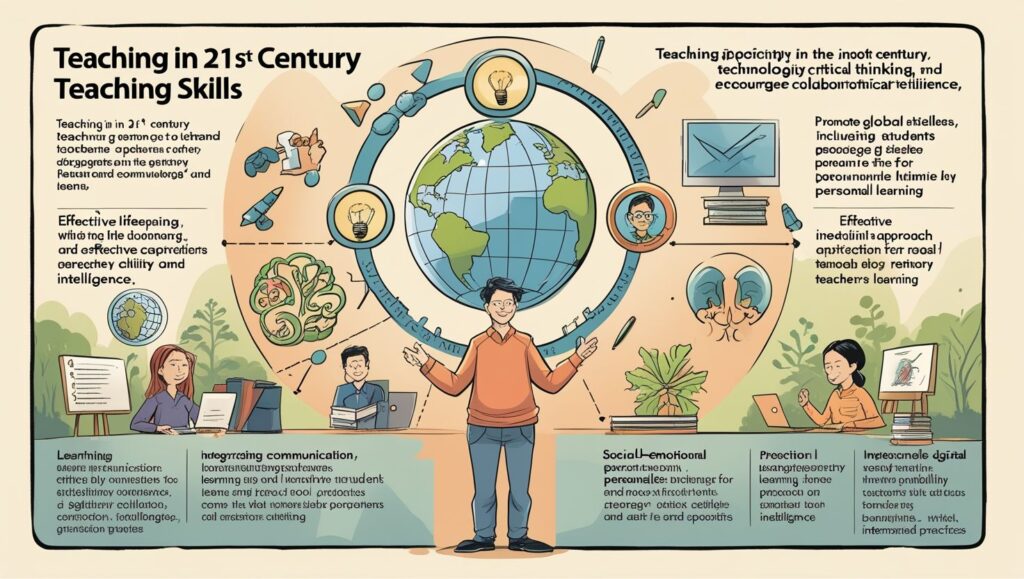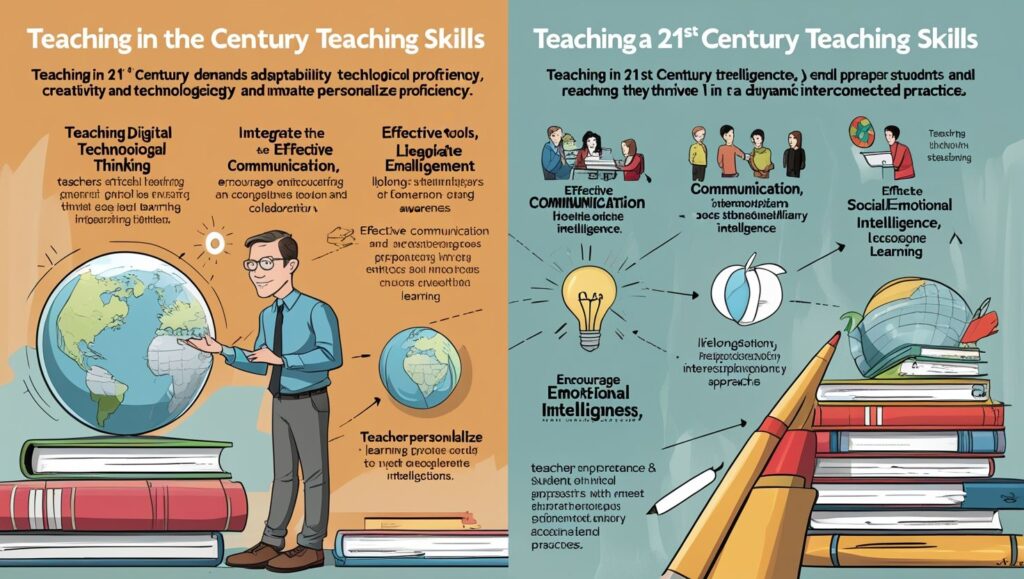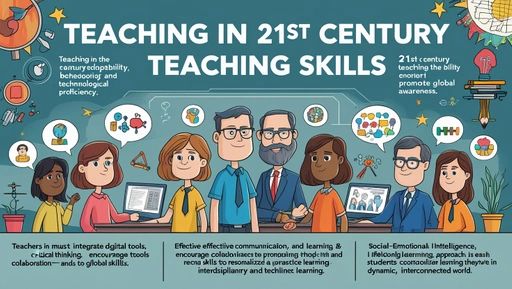Introduction
21st Century Teaching Skills, Teaching in the 21st century requires educators to go beyond traditional methods and adapt to the evolving needs of learners. In an era defined by rapid technological advancements, global connectivity, and diverse societal challenges, effective teaching skills encompass creativity, adaptability, and a learner-centered approach. These skills equip teachers to foster critical thinking, collaboration, and lifelong learning in their students.
1. Digital Literacy
Digital literacy is a cornerstone of 21st-century teaching. Educators must be proficient in using technology to enhance learning outcomes. This includes utilizing digital tools such as interactive whiteboards, learning management systems, and educational apps to make lessons engaging and accessible. Teachers should also guide students in responsible digital citizenship, teaching them how to navigate the internet safely, evaluate sources critically, and utilize technology ethically.
2. Critical Thinking and Problem-Solving
Teachers today are facilitators of learning rather than sole sources of knowledge. Encouraging critical thinking helps students analyze complex issues, evaluate different perspectives, and devise solutions. Teachers should employ strategies like inquiry-based learning and project-based learning to promote problem-solving skills. These methods not only enhance understanding but also prepare students for real-world challenges.
3. Collaboration and Teamwork
Modern teaching emphasizes collaboration among students. Group activities, peer assessments, and collaborative projects encourage students to work together, share ideas, and value diverse perspectives. Teachers play a vital role in structuring such activities to ensure inclusivity and constructive participation. Collaboration also extends to working with parents, colleagues, and the wider community to create a supportive learning environment.
4. Communication Skills
Effective communication is essential for conveying ideas clearly and fostering a supportive classroom environment. Teachers must be adept at both verbal and non-verbal communication to connect with students of varying abilities and backgrounds. Active listening, empathy, and cultural sensitivity are critical for building trust and understanding in diverse classrooms.

5. Adaptability and Flexibility
The dynamic nature of the 21st century demands that teachers be adaptable. This involves being open to new teaching methods, embracing unexpected changes, and modifying lesson plans to suit diverse learning needs. For example, during the COVID-19 pandemic, many educators transitioned to online teaching, showcasing the importance of flexibility in education.
6. Creativity and Innovation
Creativity in teaching inspires students to think outside the box and explore new ideas. Teachers can foster innovation by designing lessons that encourage imagination, experimentation, and risk-taking. Incorporating art, storytelling, and hands-on activities can make learning more engaging and memorable.
7. Global and Cultural Awareness
With increasing globalization, teachers must prepare students to thrive in a multicultural world. This includes incorporating diverse perspectives into lessons and encouraging respect for different cultures. Educators can integrate global issues such as climate change, social justice, and international relations into their curricula to develop students’ global competencies.
8. Social and Emotional Intelligence
Understanding students’ emotional and social needs is crucial for effective teaching. Social and emotional intelligence helps teachers create a positive classroom atmosphere where students feel valued and supported. Activities that promote empathy, self-awareness, and interpersonal skills contribute to students’ overall development and well-being.
9. Lifelong Learning Mindset
Teachers must model lifelong learning by staying updated with the latest educational trends and research. Continuous professional development through workshops, courses, and conferences helps educators refine their skills and remain effective in their roles. A commitment to learning demonstrates to students the value of curiosity and intellectual growth.
10. Assessment and Data Analysis
Modern teaching involves using assessments not only to measure performance but also to inform instruction. Teachers should be skilled in designing formative and summative assessments that align with learning objectives. Additionally, analyzing data from these assessments enables educators to identify gaps in understanding and tailor their teaching strategies to meet students’ needs.

11. Leadership and Classroom Management
Effective classroom management ensures a conducive learning environment. Teachers must set clear expectations, establish routines, and address behavioral issues constructively. Leadership skills also extend to inspiring and motivating students, fostering a sense of responsibility, and encouraging self-discipline.
12. Integration of Interdisciplinary Approaches
The ability to connect concepts across different subjects enhances students’ holistic understanding. For instance, a lesson on climate change might integrate science, geography, and economics, helping students grasp its multifaceted nature. Teachers who adopt interdisciplinary approaches cultivate critical thinking and creativity in learners.
13. Ethical and Reflective Practices
Teachers are role models for ethical behavior. They must uphold integrity, fairness, and respect in their interactions. Reflective practices, such as evaluating their teaching methods and seeking feedback, help educators improve and remain effective in addressing students’ needs.
14. Encouraging Student Agency
Empowering students to take ownership of their learning fosters independence and self-motivation. Teachers can encourage agency by offering choices in assignments, involving students in goal-setting, and promoting self-assessment. This approach builds confidence and prepares students for lifelong learning.
Conclusion
The 21st-century teaching landscape requires a multifaceted skill set that aligns with the demands of a globalized, technology-driven world. By integrating these skills into their practice, educators can create dynamic, inclusive, and innovative learning environments that equip students to navigate future challenges. As education continues to evolve, teachers’ ability to adapt and inspire will remain central to their success.

9 thoughts on “21st Century Teaching Skills”
Comments are closed.